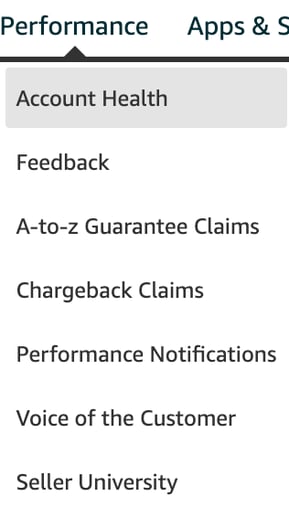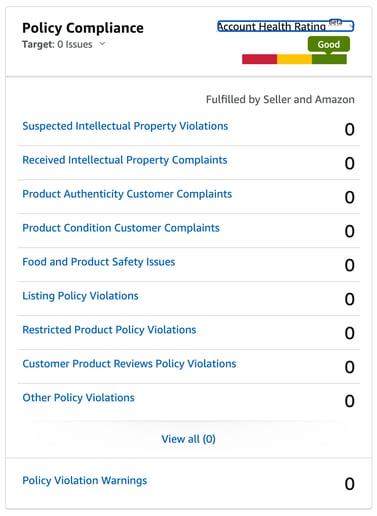Many brands selling on Amazon have noticed an increase in product compliance issues. Amazon is flagging or suspending product listings in record numbers despite the fact that the products in question are oftentimes compliant with all of the seller guidelines.
The most common ‘violations’ are related to Intellectual Property, Complaints (e.g. a ‘New’ product reported by a customer as ‘Used’) and Restricted Product Policy Violations. When a product gets flagged, brands need to appeal effectively otherwise they run the risk of losing huge amounts of revenue while the ASIN is down.
The Bobsled team have compiled their best practices about how to manage this type of situation. Read on to learn more!

How do I know if my product has been flagged by Amazon?
Brands will learn about product compliance issues by selecting Account Health under the Performance section of their dashboard.
Within Account Health you can view the current status of any Policy Compliance issues.


Sometimes Amazon will suspend product listings immediately, and for other violations they will simply let you know that the listing is at risk of removal.
What do I do if my listing gets flagged by Amazon?
“Historically, brands would have to email all of their supporting evidence to Amazon as part of their product listing reinstatement efforts,” explains Bobsled Operations Manager Jordan Ripley. “But Amazon somewhat recently overhauled their submission process so it's all in the Seller Central interface rather than via an email to a dedicated appeals team.”

Above: Screenshot of ongoing product compliance cases within the ‘Account Health’ section of the dashboard.
If your product gets flagged, here’s Jordan’s recommendations about how to proceed:

1. Review the violation details closely. First
and foremost, you want to get a very clear understanding of why your product has been flagged by Amazon. The nature of the compliance issue could be related to a manufacturing problem, fulfillment/shipment error, unauthorized third-party seller activity, or a totally unfounded claim against a perfectly viable product.
2. Compile all the required documentation. Amazon will ask for specific info such as manufacturing invoices and a Plan of Action (POA). Ensure you acquire all the right information that directly relates to the specifics of the alleged violation.
3. Send all the appeal documentation through the Account Health portal. Once you have successfully delivered all the required info, you can view that status of the case by clicking the ‘View appeal’ button.
4. Wait 5 business days. Although it can be excruciating to wait for a response while your product is suspended, refrain from opening a new case. You should get some type of update or resolution within a week.
5. Deliver follow-up material. In some instances, Amazon will request more documentation regarding the specifics of your case.
6. Escalate (if necessary). If the ultimate feedback you get from the Account Health team is unsatisfactory, you should find a way to escalate your case. The primary account owner should send an email with all the case details to Amazon Support. Also, if you have any direct contacts at Amazon, reach out and see if they can connect you with a senior member of the Account Health team.
.png)

